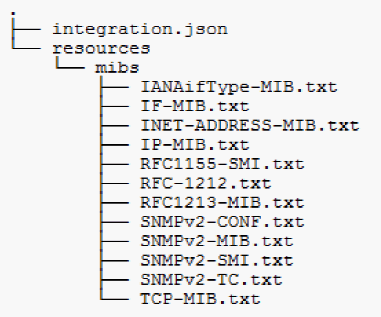Collecting SNMP Integration data
 Suggest changes
Suggest changes


The integration SNMP data source allows you to collect generic SNMP data in OnCommand Insight.
Integration packs
The SNMP Integration data source uses an “Integration Pack” to define what integration values are collected, and what SNMP objects provide those values.
An Integration Pack consists of:
-
A JSON configuration file (integration.json) defining integration payload contents in terms of SNMP objects of a specific device type (switch, router, and so on).
-
A list of MIB files that the integration pack depends on.
An integration pack can define multiple data types. For example, when integrating an RHEL host, a data type can be defined for the general system information such as uptime, number of users, and number of running processes, a second data type can be defined for data on memory and file system usage. In general, each data type must be “flat” and cannot contain nested data.
A single integration pack should not define more than 24 data types. Insight limits the amount of integration data that is collected. Attempting to ingest more than 24 reports over a period of one minute results in a rate error.
The names for integration types must adhere to the following rules:
-
The name cannot start with the following characters: _, -, or,+
-
The name cannot contain the following characters: #, \, /, *, ?, ", <, >, |, ' , `,
-
Cannot be longer than 100 UTF-8 encoded bytes
-
Cannot be named . or ..
Integration file format
An integration pack is a ZIP file that contains a JSON configuration file (integration.json) defining the integration payload contents in terms of SNMP objects. It also contains a MIBS folder that contains all of the MIB files and their MIB dependencies.
The integration.json file must exist at the top level of the ZIP file and the MIB files must exist in the "resources/mibs" subdirectory within the ZIP. The ZIP file may also contain files, such as a "readme.txt", if desired. An example of integration ZIP structure is:



